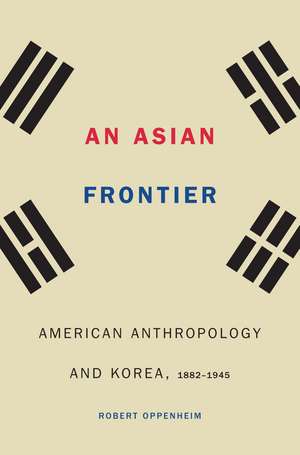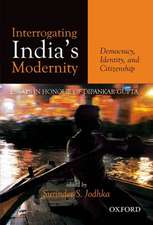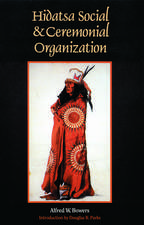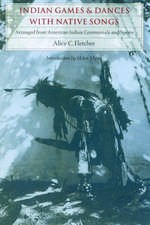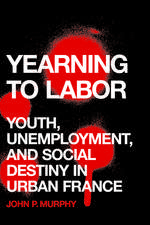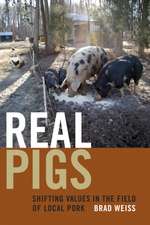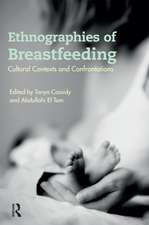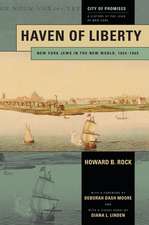An Asian Frontier: American Anthropology and Korea, 1882–1945: Critical Studies in the History of Anthropology
Autor Robert Oppenheimen Limba Engleză Hardback – 31 mai 2016
In the nineteenth century the predominant focus of American anthropology centered on the native peoples of North America, and most anthropologists would argue that Korea during this period was hardly a cultural area of great anthropological interest. However, this perspective underestimates Korea as a significant object of concern for American anthropology during the period from 1882 to 1945—otherwise a turbulent, transitional period in Korea’s history. An Asian Frontier focuses on the dialogue between the American anthropological tradition and Korea, from Korea’s first treaty with the United States to the end of World War II, with the goal of rereading anthropology’s history and theoretical development through its Pacific frontier.
Drawing on notebooks and personal correspondence as well as the publications of anthropologists of the day, Robert Oppenheim shows how and why Korea became an important object of study—with, for instance, more published about Korea in the pages of American Anthropologist before 1900 than would be seen for decades after. Oppenheim chronicles the actions of American collectors, Korean mediators, and metropolitan curators who first created Korean anthropological exhibitions for the public. He moves on to examine anthropologists—such as Aleš Hrdlicka, Walter Hough, Stewart Culin, Frederick Starr, and Frank Hamilton Cushing—who fit Korea into frameworks of evolution, culture, and race even as they engaged questions of imperialism that were raised by Japan’s colonization of the country. In tracing the development of American anthropology’s understanding of Korea, Oppenheim discloses the legacy present in our ongoing understanding of Korea and of anthropology’s past.
Drawing on notebooks and personal correspondence as well as the publications of anthropologists of the day, Robert Oppenheim shows how and why Korea became an important object of study—with, for instance, more published about Korea in the pages of American Anthropologist before 1900 than would be seen for decades after. Oppenheim chronicles the actions of American collectors, Korean mediators, and metropolitan curators who first created Korean anthropological exhibitions for the public. He moves on to examine anthropologists—such as Aleš Hrdlicka, Walter Hough, Stewart Culin, Frederick Starr, and Frank Hamilton Cushing—who fit Korea into frameworks of evolution, culture, and race even as they engaged questions of imperialism that were raised by Japan’s colonization of the country. In tracing the development of American anthropology’s understanding of Korea, Oppenheim discloses the legacy present in our ongoing understanding of Korea and of anthropology’s past.
Din seria Critical Studies in the History of Anthropology
-
 Preț: 361.96 lei
Preț: 361.96 lei -
 Preț: 213.84 lei
Preț: 213.84 lei -
 Preț: 231.34 lei
Preț: 231.34 lei - 19%
 Preț: 511.73 lei
Preț: 511.73 lei -
 Preț: 292.10 lei
Preț: 292.10 lei -
 Preț: 459.87 lei
Preț: 459.87 lei -
 Preț: 141.40 lei
Preț: 141.40 lei - 23%
 Preț: 441.74 lei
Preț: 441.74 lei -
 Preț: 217.79 lei
Preț: 217.79 lei -
 Preț: 217.04 lei
Preț: 217.04 lei -
 Preț: 229.02 lei
Preț: 229.02 lei -
 Preț: 222.59 lei
Preț: 222.59 lei -
 Preț: 215.96 lei
Preț: 215.96 lei -
 Preț: 419.27 lei
Preț: 419.27 lei -
 Preț: 214.25 lei
Preț: 214.25 lei -
 Preț: 205.23 lei
Preț: 205.23 lei - 15%
 Preț: 444.75 lei
Preț: 444.75 lei -
 Preț: 355.33 lei
Preț: 355.33 lei -
 Preț: 311.42 lei
Preț: 311.42 lei -
 Preț: 500.19 lei
Preț: 500.19 lei -
 Preț: 278.28 lei
Preț: 278.28 lei -
 Preț: 425.69 lei
Preț: 425.69 lei -
 Preț: 252.36 lei
Preț: 252.36 lei - 23%
 Preț: 448.57 lei
Preț: 448.57 lei -
 Preț: 388.17 lei
Preț: 388.17 lei -
 Preț: 317.95 lei
Preț: 317.95 lei -
 Preț: 252.74 lei
Preț: 252.74 lei -
 Preț: 401.23 lei
Preț: 401.23 lei -
 Preț: 292.12 lei
Preț: 292.12 lei -
 Preț: 212.92 lei
Preț: 212.92 lei -
 Preț: 461.75 lei
Preț: 461.75 lei -
 Preț: 211.63 lei
Preț: 211.63 lei - 15%
 Preț: 480.73 lei
Preț: 480.73 lei -
 Preț: 396.77 lei
Preț: 396.77 lei -
 Preț: 471.22 lei
Preț: 471.22 lei -
 Preț: 369.50 lei
Preț: 369.50 lei - 15%
 Preț: 456.84 lei
Preț: 456.84 lei - 14%
 Preț: 501.01 lei
Preț: 501.01 lei
Preț: 449.25 lei
Preț vechi: 528.54 lei
-15% Nou
Puncte Express: 674
Preț estimativ în valută:
85.98€ • 89.57$ • 71.48£
85.98€ • 89.57$ • 71.48£
Carte tipărită la comandă
Livrare economică 10-24 februarie 25
Preluare comenzi: 021 569.72.76
Specificații
ISBN-13: 9780803285613
ISBN-10: 0803285612
Pagini: 450
Ilustrații: 7 illustrations
Dimensiuni: 152 x 229 x 36 mm
Greutate: 0.81 kg
Editura: Nebraska
Colecția University of Nebraska Press
Seria Critical Studies in the History of Anthropology
Locul publicării:United States
ISBN-10: 0803285612
Pagini: 450
Ilustrații: 7 illustrations
Dimensiuni: 152 x 229 x 36 mm
Greutate: 0.81 kg
Editura: Nebraska
Colecția University of Nebraska Press
Seria Critical Studies in the History of Anthropology
Locul publicării:United States
Notă biografică
Robert Oppenheim is an associate professor of Asian studies and anthropology at the University of Texas at Austin. He is the author of Kyongju Things: Assembling Place.
Cuprins
List of Figures
Series Editors’ Introduction
Acknowledgments
Note on Editorial Method
Introduction: Tracings of Discipline and Shadows of Area
1. Anthropological Collecting Networks in Late Nineteenth-Century Korea
2. Ceramic Economies
3. From China in America to Korea in Chicago
4. Orientalist against Orientalism
5. The Anthropologist without Qualities
6. Worlding Korea from Without and Within
7. Interwar Asymmetries of Race and Anti-imperialism
Conclusion: Legacies
Source Acknowledgments
Notes
Bibliography
Index
Recenzii
"An Asian Frontier is a subtle and revealing study of the interplay between disciplinary centers of theory and ethnographic encounters, a relationship that lays at the heart of almost all anthropology."—Ira Jacknis, Anthropological Quarterly
"For its original, learned, and well-crafted studies of diffusionist and evolutionist anthropology as actually practiced, An Asian Frontier should be required reading for all historians of the discipline. . . . This wide-ranging study locates the origins of American anthropological knowledge about Korea in an imperial context, while avoiding the temptation to treat its founders as two-dimensional villains. With reference to an impressive array of documentation, Oppenheim situates their activities within immediate institutional settings and the trajectories of individual scientific careers. . . . An Asian Frontier demonstrates that Koreans from many walks of life participated in the politically consequential battles to shape the picture of Korea in US anthropological circles and beyond."—Paul D. Barclay, Pacific Affairs
"Through showing how difference was constructed, categorized and represented in relation to notions of white supremacy An Asian Frontier is the story of anthropology and its often complex, sometimes troubling relationship to the people who fall within the gaze of the ethnographer. Oppenheim has written a fascinating account of the early days of anthropological engagement with what was, at the time in the U.S, a largely unknown part of the world."—Markus Bell, European Journal of Korean Studies
“An Asian Frontier makes a novel contribution to the history of anthropology and to the history of the study of Korea. . . . Interesting, provocative, and singular.”—Laura Nelson, associate professor of women’s and gender studies at the University of California, Berkeley, and author of Measured Excess: Status, Gender, and Consumer Nationalism in South Korea
“Oppenheim’s research and writing are informed by sophisticated perspectives on how science is done and its results communicated. . . . A major contribution to seeing non-Americanist work during the time in which museums and university departments of anthropology began.”—Stephen O. Murray, director of El Instituto Obregón in San Francisco and coauthor of Looking Through Taiwan: American Anthropologists’ Collusion with Ethnic Domination
